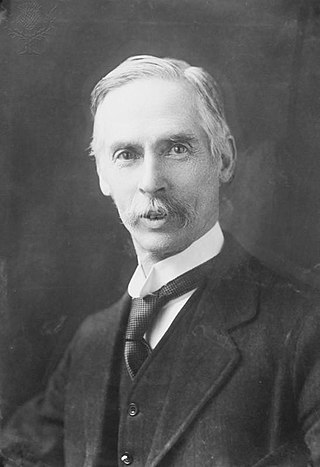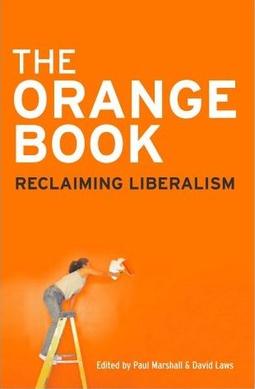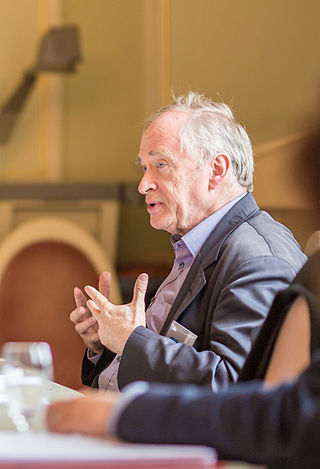Related Research Articles

The Liberal Party was one of the two major political parties in the United Kingdom, along with the Conservative Party, in the 19th and early 20th centuries. Beginning as an alliance of Whigs, free trade–supporting Peelites, and reformist Radicals in the 1850s, by the end of the 19th century, it had formed four governments under William Gladstone. Despite being divided over the issue of Irish Home Rule, the party returned to government in 1905 and won a landslide victory in the 1906 general election. Under prime ministers Henry Campbell-Bannerman (1905–1908) and H. H. Asquith (1908–1916), the Liberal Party passed reforms that created a basic welfare state. Although Asquith was the party leader, its dominant figure was David Lloyd George.
Classical liberalism is a political tradition and a branch of liberalism that advocates free market and laissez-faire economics and civil liberties under the rule of law, with special emphasis on individual autonomy, limited government, economic freedom, political freedom and freedom of speech. Classical liberalism, contrary to liberal branches like social liberalism, looks more negatively on social policies, taxation and the state involvement in the lives of individuals, and it advocates deregulation.

The People's Party for Freedom and Democracy is a conservative-liberal political party in the Netherlands. The VVD, whose forerunner was the Freedom Party, is a party of the centre-right that tries to promote private enterprise and economic liberalism.

John Atkinson Hobson was an English economist and social scientist. Hobson is best known for his writing on imperialism, which influenced Vladimir Lenin, and his theory of underconsumption.
The Free Trade Party, officially known as the Free Trade and Liberal Association, and also referred to as the Revenue Tariff Party in some states, was an Australian political party, formally organised in 1887 in New South Wales, in time for the 1887 New South Wales colonial election, which the party won.

The Liberal Party is a liberal political party in the United Kingdom that was founded in 1989 as a continuation of the original Liberal Party by members who opposed its merger with the Social Democratic Party (SDP) to form the Liberal Democrats. The party holds five local council seats. The party promotes a hybrid of both classical and social liberal tendencies.
Social liberalism is a political philosophy and variety of liberalism that endorses social justice, social services, a mixed economy, and the expansion of civil and political rights, as opposed to classical liberalism which supports unregulated laissez-faire capitalism with very few government services.
Liberal conservatism is a political ideology combining conservative policies with liberal stances, especially on economic issues but also on social and ethical matters, representing a brand of political conservatism strongly influenced by liberalism.
In the United Kingdom, the word liberalism can have any of several meanings. Scholars primarily use the term to refer to classical liberalism. The term can also mean economic liberalism, social liberalism or political liberalism. It can simply refer to the ideology and practises of the historic Liberal Party (1859-1988), or in the modern context, of the Liberal Democrats, a UK party formed after the original Liberal Party's demise.
In Australia, liberalism has a vast interpretation and a broad definition. It dates back to the earliest Australian pioneers and has maintained a strong foothold to the present day. Modern-day Australian liberalism is the successor to colonial liberalism, and has been compared to British liberalism for its similarity. The primary representation of Australian liberalism is the centre-right Liberal Party of Australia. Unlike in the United States, liberalism in Australia, and the term "liberal", is often associated with conservatism.

The Orange Book: Reclaiming Liberalism is a book written by a group of prominent British Liberal Democrat politicians and edited by David Laws and Paul Marshall in 2004. Three contributors later became leaders of the Liberal Democrats: Nick Clegg, Vince Cable and Ed Davey. Other contributors include Chris Huhne, Susan Kramer, Mark Oaten and Steve Webb. The book's central philosophy, and some of its ideas, are supported by Liberal Reform, an internal group of the Liberal Democrats.

Imperialism: A Study (1902), by John A. Hobson, is a politico-economic discourse about the negative financial, economic, and moral aspects of imperialism as a nationalistic business enterprise. Hobson argues that capitalist business activity brought about imperialism.
Modern liberalism in the United States is based on the combined ideas of civil liberty and equality with support for social justice. It is one of two major political ideologies of the United States, with the other being conservatism. Economically, modern liberalism supports government regulation on private industry, opposes corporate monopolies, and supports labor rights. Its fiscal policy opposes any reduction in spending on the social safety net, while simultaneously promoting income-proportional tax reform policies to reduce deficits. It calls for active government involvement in other social and economic matters such as: reducing economic inequality, increasing diversity, expanding access to education and healthcare, regulating economic activity, and environmentalism. Modern liberalism is a large and mainstream ideology in the Democratic Party and nation. Modern liberalism was formed in the 20th century in response to the Great Depression. Major examples of modern liberal policy programs include the New Deal, the Fair Deal, the New Frontier, the Great Society, the Affordable Care Act, the Infrastructure Investment and Jobs Act, and the Inflation Reduction Act.

The Independent Liberals were a political party in Israel that existed between 1965 and 1992.
Liberalism is a political and moral philosophy based on the rights of the individual, liberty, consent of the governed, political equality, right to private property and equality before the law. Liberals espouse various and often mutually warring views depending on their understanding of these principles but generally support private property, market economies, individual rights, liberal democracy, secularism, rule of law, economic and political freedom, freedom of speech, freedom of the press, freedom of assembly, and freedom of religion, Liberalism is frequently cited as the dominant ideology of modern history.

Michael Freeden is a Professor at the Department of Politics and International Studies at the School of Oriental and African Studies, University of London. He is also Emeritus Professorial Fellow at Mansfield College, Oxford. Between 2013 and 2015, he was Professor of Political Theory in the School of Politics and International Relations at the University of Nottingham. He is a leading theorist of ideology and the founding editor of the Journal of Political Ideologies.
The League of Nations Union (LNU) was an organization formed in October 1918 in Great Britain to promote international justice, collective security and a permanent peace between nations based upon the ideals of the League of Nations. The League of Nations was established by the Great Powers as part of the Paris Peace Treaties, the international settlement that followed the First World War. The creation of a general association of nations was the final one of President Woodrow Wilson's Fourteen Points. The LNU became the largest and most influential organisation in the British peace movement. By the mid-1920s, it had over a quarter of a million registered subscribers and its membership eventually peaked at around 407,775 in 1931. By the 1940s, after the disappointments of the international crises of the 1930s and the descent into World War II, membership fell to about 100,000.
Economic liberalism is a political and economic ideology that supports a market economy based on individualism and private property in the means of production. Adam Smith is considered one of the primary initial writers on economic liberalism, and his writing is generally regarded as representing the economic expression of 19th-century liberalism up until the Great Depression and rise of Keynesianism in the 20th century. Historically, economic liberalism arose in response to feudalism and mercantilism.
The 1902 Cleveland by-election was a parliamentary by-election held for the British House of Commons constituency of Cleveland in the North Riding of Yorkshire on 5 November 1902.
Secular liberalism is a form of liberalism in which secularist principles and values, and sometimes non-religious ethics, are especially emphasised. It supports the separation of religion and state. Moreover, secular liberals are usually advocates of liberal democracy and the open society as models for organising stable and peaceful societies.
References
- ↑ "RAINBOW CIRCLE AND THE NEW LIBERALISM" (PDF). Journal of Liberal History 38. Spring 2023.
- ↑ "Archive Briefing Paper - Liberal History" (PDF). Archived from the original (PDF) on 2007-06-10. Retrieved 2008-03-21.
- ↑ James Hobson – Liberal Thinkers – Liberalism Archived 2008-03-31 at the Wayback Machine